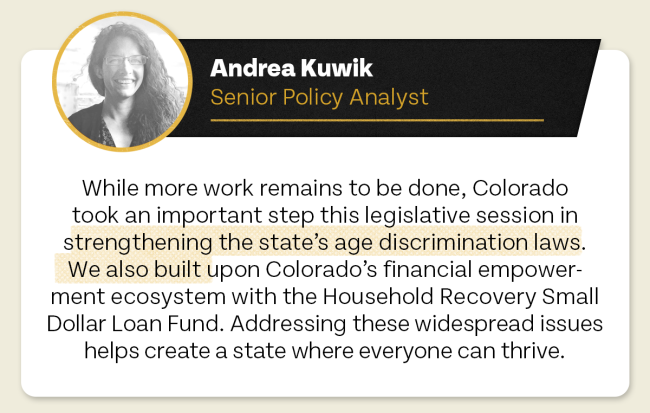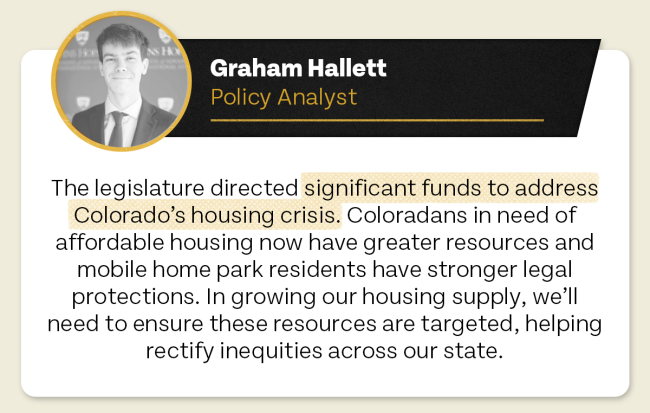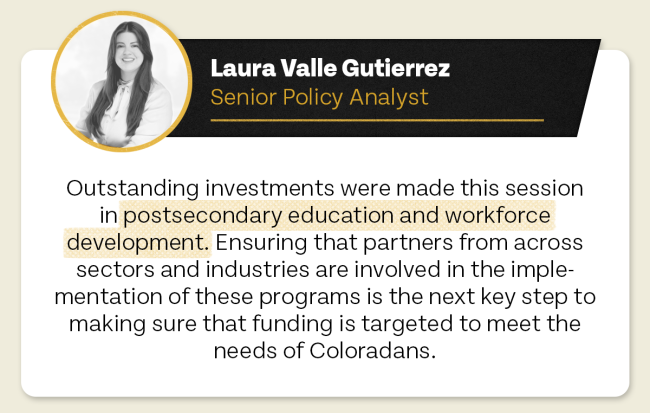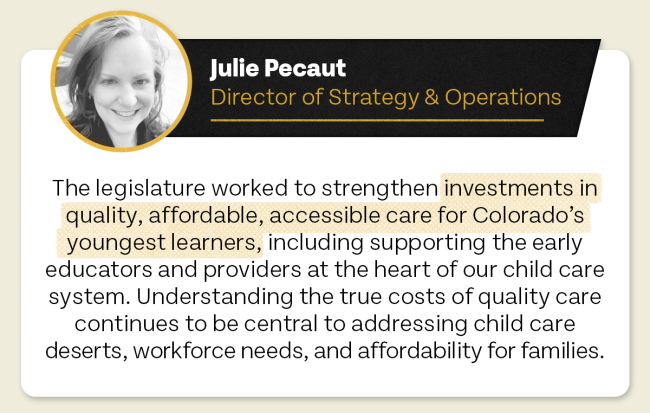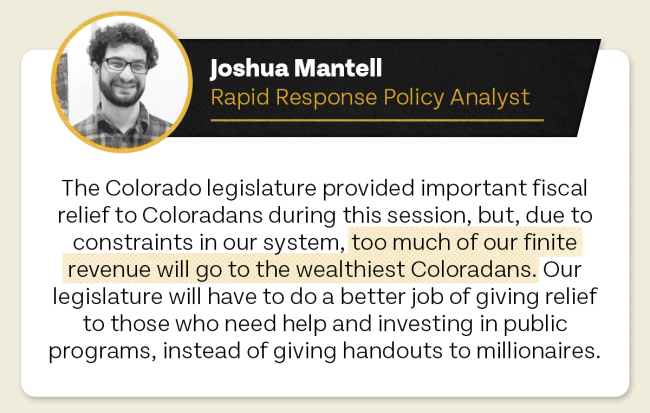2022 Legislative Session Recap
The 2022 legislative session mirrored the complicated and confusing economic circumstances it was trying to tackle. With funds designed to help pull us out of a catastrophic pandemic and a very rare amount of one time state dollars, the legislature attempted to quell concerns over rising costs as best it could, keenly aware that structural issues that predated the pandemic still remain to be tackled.
And while important foundations were laid for housing and childcare affordability, it is clear to us that the big work of making our state’s funding fair and sustainable will have to wait until next year.
From our perspective, many of this legislature’s efforts to reduce the cost of living for those most impacted by economic inequality often got confused with broad based tax and fee relief that papered over our state’s financial challenges and a lopsided tax code that benefits its wealthiest residents. Lost in the messaging is the idea that state and local services, when adequately funded, actually save many people money. That’s why we emphasized the need for targeted tax and fee relief whenever possible.
It’s impossible to evaluate this legislative session without considering the coming election and the various political crosswinds that distracted them from their tasks. Despite these distractions, the 2022 legislative session dedicated itself to continuing a vision for a Colorado that we have long fought for; delivering on support for our public education system and future of work, housing affordability, helping our aging population, the caring workforce, and broadly supporting workers.
Fiscal Issues
- Colorado’s economy has rebounded mightily since 2020, leading to the ability to invest in Colorado communities and provide help and support to Coloradans across the state. But this reality on the macro level is masking a lot of pain and affordability issues for millions of people across our state. Our own data shows that while median wages have remained flat, income at the very top has increased dramatically. Given the increase in temporary federal dollars, lawmakers decided to pass along tax and fee relief for people across Colorado to help alleviate some of these cost burdens.
- A host of income tax cut measures were brought forward in the legislature this year, and more are coming on the ballot. Fortunately, legislative leaders stood strong and defeated these regressive proposals that would have put more money into the hands of the already wealthy.
- With our state’s largest TABOR rebate slated to go back to voters in 2023, there was a huge opportunity for the legislature to update the rebate formula to reflect the needs of today’s economy. Specifically, The Bell Policy Center supported efforts to even the entire TABOR rebate taxpayers received, so that every taxpayer regardless of income received the same amount back. We also urged legislators to question whether or not taxpayers who earned over $500,000 in annual income should receive any rebate at all.
- The Governor’s announcement of $400 “Colorado Dividend” checks, essentially reforming the six-tier sales tax portion of the rebate formula, reflected this advocacy. Future efforts to reform the TABOR rebate mechanism should also include an examination of the temporary income tax reduction that occurs in surplus years. When our flat income tax rate is reduced, 24 percent of income tax cuts go to the top 1 percent of Colorado taxpayers. More importantly, however, we must get back to the fundamental conversation about how these dollars are not “surplus” dollars. By 2024, the state will run out of room between its priority expenditures and TABOR’s arbitrary revenue cap. While we support tax relief for low and middle income families, we reject the argument that these dollars, the revenue collected from current tax rates, are not needed to fully fund our schools and all of the other vital public services Coloradans expect from their state.
- Of course, to fully fund those services, adequate property tax revenue is essential. The future of that revenue came into question as various groups submitted ballot proposals that would severely limit the amount of tax revenue collected by local governments. Here, The Bell Policy Center played an instrumental role in educating the public about these dangerous measures and advancing our own measures to counter their impact. After all parties agreed to withdraw their ballot initiatives, the passage of SB-238 should be viewed as a time out from the debate, but not a resolution. Over the next two years, the bill will temporarily lower property tax rates for residential and commercial properties, reducing revenue across the state by $700 million. The deal also includes broad exemptions for residential and commercial properties. Any future attempt to reform our property tax code must create a smarter system that can distinguish between high value homes, apartment buildings, short term rentals, and other kinds of housing in an effort to create a fairer revenue base for our local communities, and ensure that tax relief is going to Coloradans that need it.
- New ballot title language requirements, passed by last year’s legislature, played a significant role at the title board. Proponents of extremely damaging measures received ballot titles that reflected the funding hit that communities would see. This year, the Bell worked hard to pass SB-222. If approved by voters in this year’s election, any ballot measure changing income tax rates will include a tax table showing how the change impacts various tax brackets. We’re excited to work with a broad coalition of advocates to ensure the measure passes.
Education
- This session, legislators worked to invest in our education and workforce systems through a package of bills: HB-1349, HB-1350, and SB-192. All these bills were borne out of previous legislation which required a statewide stakeholder process for recommendations on improving the state’s postsecondary education system. Notably, SB-192 will lead to the creation of statewide stackable credential programs in growing industries. Additionally, HB-1350 establishes a regional grant program for talent pipeline development. Lastly, HB-1366 passed to help the state improve FAFSA completion and ensure that federal dollars aren’t left on the table.
- Legislators also centered students by passing HB-1049 which prohibits postsecondary institutions from withholding transcripts as a debt collection mechanism. This important consumer protection ensures that minor unpaid fines and fees don’t pose a barrier to students being able to use their credentials to advance their career.
Child Care
- Colorado took significant steps in building a more integrated, equitable, and coordinated early care and education system with legislation to implement the new Department of Early Childhood and universal preschool program; this legislation builds on last session’s work to establish the department as well as on input from parents, caregivers, providers, and advocates around the state. Through SB22-213, the state also invested federal relief funding in several key programs to sustain and strengthen early care and education, including child care sustainability grants, the early educator recruitment and retention scholarship program, the child care facility grant program, and support for home visiting programs and family-strengthening programs.
- Legislators also took steps to strengthen support for early educators, including HB-1010, the Early Childhood Educator Tax Credit, a refundable credit to encourage early educators to build their credentials and lend their experience and expertise to the field.
- Legislators also made use of tax exemptions to support nonprofit child care centers leasing their space (HB-1006, Child Care Center Property Tax Exemption), as well as to begin to address a key barrier to parents’ ability to make use of child care: the cost of diapers (HB-1055, Sales Tax Exemption on Essential Hygiene Products). HB-1055 addressed household costs spanning multiple generations, adding diapers, incontinence products, and period products to the list of essential products exempt from sales tax.
Housing
- To combat the housing crisis in Colorado, legislators made significant steps this session, enacting several of the recommendations of the affordable housing task force. SB-159 and HB-1304 will devote loans and grants to develop and maintain affordable housing across the state. These funds are meant to be targeted to Coloradans most in need. Similarly, SB-146 intends to address the “missing middle” by providing further financing for middle-income Coloradans in housing stressed situations. This targeted approach continued in SB-160, a bill that will aid mobile homeowners in purchasing their mobile home parks and provide rental assistance. Finally, HB-1282 will assist Colorado businesses in quickly manufacturing pre-fab, kit, tiny, and 3-D printed homes.
Economic Support
- Despite a growing economy, too many Coloradans are struggling. For these economically vulnerable individuals, a lack of access to affordable financial products can exacerbate financial challenges. The Bell Policy Center led the effort to create a responsible alternative to these products. HB22-1359 offers a mechanism to bolster these Coloradans’ financial security. Using a seed fund of $5M, the state will work with private and philanthropic partners to build a structure that facilitates the development of new, small dollar loan products with affordable interest rates. Together with the Secure Savings and Office of Financial Empowerment initiatives that were passed in prior sessions, Colorado is on its way toward build a Financial Empowerment ecosystem across our state.
- In the initial months of the economic crisis at the beginning of 2020, policy leaders made several important, but temporary, changes to our unemployment insurance (UI) system. Many of these changes played a crucial role in keeping millions of workers who lost their job economically afloat. Thanks to the good work of organizations like the Colorado Fiscal Institute, HB22-234 makes several of these worker-friendly changes permanent within our UI system, so the next we have an economic downturn, our families and communities will have a stronger UI system to rely upon.
Aging
- Age discrimination is a significant problem with severe consequences for workers, businesses, and our economy. This year, however, Colorado took an important step forward in strengthening protections for older workers by passing HB22-1367. This bill updates our discrimination laws, and importantly, allows older workers to receive the same remedies as all other protected groups when they experience adverse treatment in the workplace because of their age. While we must do more to address workplace age discrimination, the passage of HB22-1367 offers valuable movement forward.
- Since its inception, the Bell has been a proud supporter and member of the Strategic Action Planning Group on Aging (SAPGA). This year, we were excited to support HB22-1035, Modernization of the Older Coloradans Act, which builds upon SAPGA’s good work by developing a unified structure within the state to support aging issues. As highlighted in our Actionable Aging Policy Agenda this statewide alignment of activities and efforts can create the synergistic, effective, and efficient solutions which allow all Coloradans to age in a way they find most meaningful.
